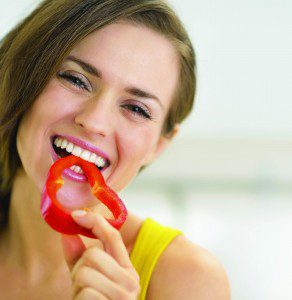By Cyndi Yag-Howard, MD, FAAD
 Antioxidants are good molecules, which clean up the bad oxygen free radicals that damage tissue, cause diseases and increase the signs of aging.
Antioxidants are good molecules, which clean up the bad oxygen free radicals that damage tissue, cause diseases and increase the signs of aging.
Environmental pollution, ultraviolet radiation, and our own metabolism create these oxygen free radicals that challenge our bodies throughout every day.
Fascinating new research on antioxidants shows that they can delay or prevent cell damage. As a result, antioxidants may be able to fight or prevent diseases and significantly improve the signs of aging.
To look good on the outside, it is critically important to treat your body well on the inside. Start with a healthy diet, which is low in saturated fats and includes a variety of colorful antioxidant-rich fruits and vegetables. Why is color important? Because vitamins in fruits and vegetables give them their color. For instance, carrots and cantaloupes are orange because of beta carotene, a vitamin A derivative that is an excellent antioxidant.
Think about it. Compare the skin on plants that we eat to your skin. Our favorite leafy greens, tomatoes, peppers, apples, grapes, etc. can bake in the sun all day every day for weeks or months without getting damaged by ultraviolet radiation. Yet your skin cannot tolerate the sun for more than a couple of hours without getting severely damaged. Why? Because fruits and vegetables contain high levels of antioxidants to fight oxygen free radicals and minimize cellular damage.
You may also consider oral and topical supplementation to enhance your antioxidant levels. There are myriad options available, so sifting through them is challenging. The most common antioxidants are vitamins A, C and E, beta-carotene, lutein, lycopene and selenium.
An oral antioxidant supplement that is specifically intended to protect the skin from the sun contains polypodium leucotomos. It comes from a fern plant that was once aquatic, but developed its own antioxidant protection to adapt to land living.
There are many topical antioxidants that not only protect the skin, but help with wrinkle reduction as well. Examples include vitamin C and vitamin A derivatives retinol, retinoid, retinoic acid or tretinoin. They can be extremely beneficial if they are in the correct formulation to achieve optimal results.
Antioxidants promote a healthy glow and a healthy you. Look as good on the outside as you feel on the inside. Consult a dermatologist for further information.
Call 239-529-DERM to schedule a consultation with Sara today!









